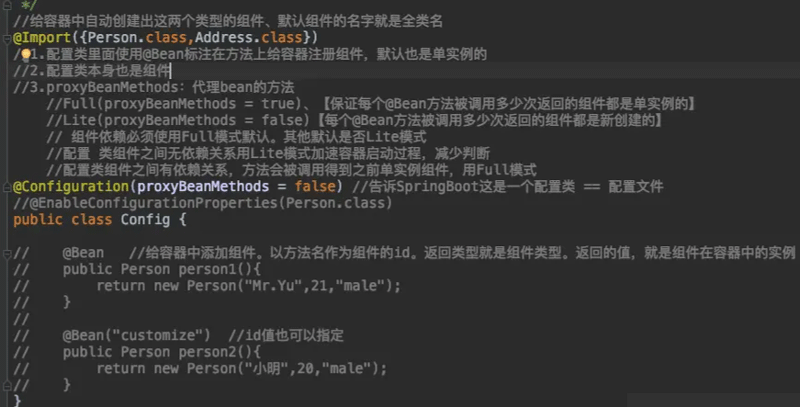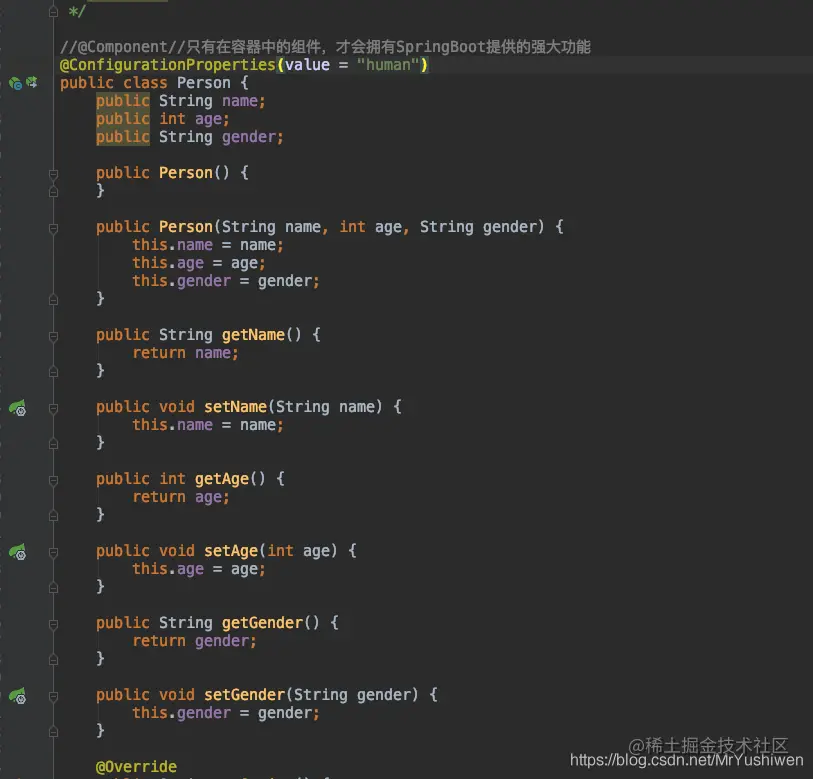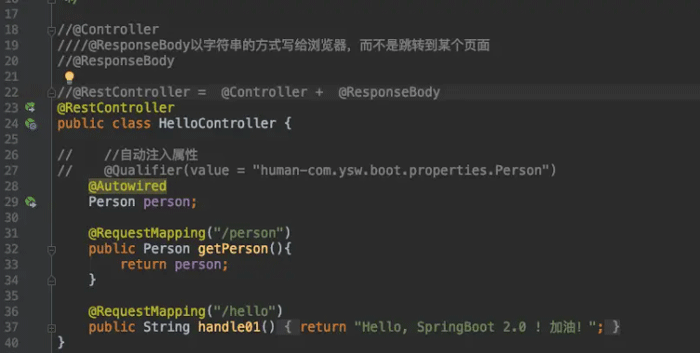SpringBoot配置绑定
YuShiwen 人气:2properties配置文件如下:
human.name=Mr.Yu human.age=21 human.gender=male
如何把properties里面的配置绑定到JavaBean里面,以前我们的做法如下:
public class PropertiesUtil {
public static void getProperties(Person person) throws IOException {
Properties properties = new Properties();
properties.load(new FileInputStream("src/main/resources/demo.properties"));
//得到配置文件key的名字
Enumeration enumeration = properties.propertyNames();
while (enumeration.hasMoreElements()){
String key =(String)enumeration.nextElement();
String value = properties.getProperty(key);
System.out.println("key="+key+"——————value="+value);
//封装到JavaBean
//以下内容省略
}
}
}输出结果:
key=human.name——————value=Mr.Yu
key=human.age——————value=21
key=human.gender——————value=maleProcess finished with exit code 0
可以看到这个过程十分繁杂,但是在SpringBoot中这个过程将会变得非常简单。
在SpringBoot中有如下3种方法:
1.@ConfigurationProperties注解+@Component(或@Controller或@Service或@Repository)注解
- 只有在容器中的组件,才会拥有SpringBoot提供的强大功能,也就是如果我们需要使用到@ConfigurationProperties注解,那么我们首先要保证该对JavaBean对象在IoC容器中,所以需要用到Component注解来添加组件到容器中。
- @ConfigurationProperties注解中prefix与value互相都是别名

- 也就是说
@ConfigurationProperties(value = "human")与@ConfigurationProperties(prefix = "human")是一样的 - prefix和value指的是前缀的意思
代码测试: properties配置文件:
human.name=Mr.Yu human.age=21 human.gender=male
Person类:
@Component ////只有在容器中的组件,才会拥有SpringBoot提供的强大功能
@ConfigurationProperties(value = "human")
public class Person {
public String name;
public int age;
public String gender;
public Person() {
}
public Person(String name, int age, String gender) {
this.name = name;
this.age = age;
this.gender = gender;
}
public String getName() {
return name;
}
public void setName(String name) {
this.name = name;
}
public int getAge() {
return age;
}
public void setAge(int age) {
this.age = age;
}
public String getGender() {
return gender;
}
public void setGender(String gender) {
this.gender = gender;
}
@Override
public String toString() {
return "Person{" +
"name='" + name + '\'' +
", age=" + age +
", gender='" + gender + '\'' +
'}';
}
}测试类如下:
//@Controller
////@ResponseBody以字符串的方式写给浏览器,而不是跳转到某个页面
//@ResponseBody
//@RestController = @Controller + @ResponseBody
@RestController
public class HelloController {
//自动注入属性
@Autowired
Person person;
@RequestMapping("/person")
public Person getPerson(){
return person;
}
}测试结果:

@ConfigurationProperties注解+@EnableConfigurationProperties注解
这种方式@EnableConfigurationProperties注解一定要在配置类上写,@EnableConfigurationProperties的意思是开启属性配置功能,开启谁的属性配置功能呢,因为我们上面的Person类想进行配置绑定,所以我们在后面加上参数Person.class:@EnableConfigurationProperties(Person.class)
@EnableConfigurationProperties(Person.class)的作用就是把这个Person组件注册到容器中,对象的名称为:human-com.ysw.boot.properties.Person 其中human是@ConfigurationProperties(value = "human")中前缀value的值
在Person类上还是有@ConfigurationProperties注解,这种方式把Person类上的@Component注解换成了配置类上的@EnableConfigurationProperties(Person.class)注解


这种方式主要用在引用第三方包时,比如第三方包中有一个Person类,该类中没有使用@Component,我们也不能够给第三方包中的类加上@Component,这个时候就可以使用在配置类上加上@EnableConfigurationProperties注解的方法。
@ConfigurationProperties注解+@Import注解
- 使用@Import给容器中自动创建出这个类型的组件、默认组件的名字就是全类名
- @Import注解与2中的@ConfigurationProperties注解效果是一样的
- 只不过他们注册到容器中的名称不同:
- @ConfigurationProperties注解注册到容器中对象的名称为:human-com.ysw.boot.properties.Person 其中human是@ConfigurationProperties(value = "human")中前缀value的值
- @Import注解注册到容器中对象的名称为:com.ysw.boot.properties.Person
配置类:

Person类:

测试类:

application.properties文件:
server.port=8888 human.name=Mr.Yu human.age=21 human.gender=male222
测试结果:

加载全部内容